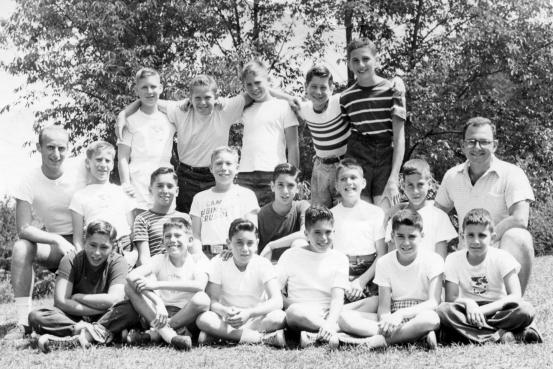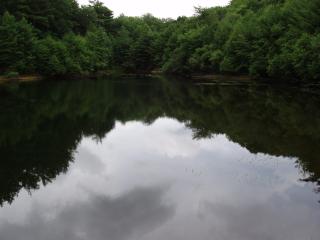
But this land was once part of the summer camp that was an important part of my youth, Camp Robinson Crusoe. When the camp closed unexpectedly just before opening for the summer of 1970, the camp land became the property of Old Sturbridge Village, a re-created New England colonial town (which the camp land abuts). Old Sturbridge Village subsequently sold the land to the Town of Sturbridge, for recreational use. The area shown in the picture was not always flooded. It was previously dry, and the site of the camp's athletic fields. Joshua Hill, grandson of the camp's founder Joshua Lieberman, said, "I believe that lake on the athletic field was created by Old Sturbridge Village as part of their abortive plans for a mill village." Others have said that the pond was created by removing gravel from the site, along with a blockage of the Hamant Brook caused by silt and debris. Still others have told me that no gravel was ever removed, and that the pond is due solely to a naturally occurring blockage of the brook. Regardless, when I was a camper between 1952 and 1955, I spent many hours on these fields, and I can assure you that I was not underwater. For the most part, camp was a wonderful experience for me. I loved it. Something new seemed to happen almost every day. But I did have the misfortune of being a rather non-athletic member of one of the most baseball intensive groups in the history of the camp. Don't get me wrong. It was a wonderful group of nice people among whom I had many good friends. But all they wanted to do was play baseball, morning after morning after morning, and I was terrible at baseball. I had never played sports before camp, and I was not at all sports oriented. So I remember my mornings as being spent on one of the camp's two baseball fields, "Way Out in Left Field", as the saying goes. Except of course I was actually Way Out in Right Field, because they put me wherever the ball was least likely to go. When a pop fly was on occasion hit my way, I had the arduous task of running over to approximately where it was going to land, and then trying to catch it while simultaneously attempting to avoid being right under it, because I might get hit by the ball and seriously hurt. This effort seldom resulted in a catch. Being an analytic sort (I did later attend MIT, after all), I do recall standing in right field one day, relatively miserable, and attempting to calculate whether, in the final analysis, I really did like camp. I thought I liked camp, but we spent so much time playing baseball, during which time I was miserable, that I was wondering whether I actually spent more time miserable than happy. Perhaps I really hated camp, but didn't know it. But even if I added in a scaling factor for extreme miserableosity, the time spent on the baseball field still only came to a couple of hours a day, so I had to conclude in the end that I was really happy after all. Of course, while I was engaged in that calculation, a ball could have landed on my head, and I wouldn't have noticed. Note 2 Baseball was not the only activity conducted on the now-flooded athletic fields. Each Sunday, there was an all-camp game of some sort, things like Capture the Flag Note 3 and Klondike Gold Rush Note 4 . One of the innovations of Camp Robinson Crusoe was that it was pretty non-competitive. Many summer camps of the era ended their summers with a massive competition often called "Color Wars", but Robinson Crusoe did not. One of the teams in our Sunday games did in fact win, and the other lose, but the competition was fairly light-hearted. Note 5 During one of our Sunday games of Capture the Flag, I had a great idea. As the first half of the game wound up, I found myself way at the far end of the athletic fields, near the far flag at the border of the woods. I was actually guarding the back of the flag, against anyone who might have circled around through the woods to attack the flag from behind. And then it dawned on me: for the second half of the game, the sides would be reversed. All I had to do was to hide in the woods behind the flag, and in the second half, I would be right next to my target. I could then swoop in from behind, before anyone would have had time to circle all the way around, through the woods along the Hamant Brook. I could thus catch the defenders unaware. And so that is what I did. I'll admit to feeling a bit sad as I watched everybody run to the opposite end of the field for juice and cookies, which I was missing in my hiding place among the tall grass and mountain laurels. And the boring half-time period seemed to go on interminably. Nevertheless, I stuck it out, and nobody seemed to miss me at all. When the game resumed, there I was, within fifty feet of my goal. I waited for what seemed like a good opportunity, and then raced out of hiding, only to be caught short of the circle by a speedy defender. Oh, well. It wasn't a bad idea.  Click on the photo to see a larger copy. Then, in most browsers, you can click on it again to see it even bigger. When done, use your "Back" button to return here. This was my group in my third year at Camp Robinson Crusoe. I was twelve years old. Separate from my blog, I maintain a fairly extensive set of pages on Camp Robinson Crusoe, which you can take a look at if you'd like by clicking on that link. The stories above first appeared on those pages, entitled Way Out in Left Field, and The Capture the Flag Caper.
  Note 1: I chose my title to evoke the song "Strawberry Fields Forever", by the Beatles, although it was not released until 1967, long after I was a camper. You can hear it, with video added, on YouTube, here, and in other versions. I don't recall any wild strawberry bushes in the woods of Sturbridge, but there were lots of wild low-bush blueberries, and I think a lot of blackberries. We used to run around in the woods without giving it a second thought. We might get a few mosquito bites, but although they were annoying, they were nothing to worry about (there's no malaria or yellow fever in the northern United States). In the seventies and eighties, my own children often played in the woods around our house, particularly evenings, with nothing to fear. The situation has now changed much for the worse. Mosquitoes in this area, particularly late in the summer, can now carry West Nile Virus, and even worse, the often-fatal Eastern Equine Encephalitis. Tiny and hence hard to spot deer ticks carry Lyme disease, which can become quite serious if not treated early on. Our local woods have become dangerous. [return to text] Note 2: A counselor did actually bounce a softball off my head once, but only lightly, trying to illustrate that it really wasn't that dangerous. This was during a private afternoon lesson, in which he endeavored to improve my softball skills. My junior scientist's brain wasn't fooled by this - there is clearly a difference between a ball lightly tossed from a few centimeters away, and a batted line drive, or a ball falling from a great height. In my first summer at the camp, in 1952, we played softball, but a summer or two later, we graduated to hardball. For readers outside the US: "baseball" is the generic term for a game which is called the "National Pastime" of the United States. When the word is used without further qualification, it generally refers to the professional version, also called "hardball", but younger players often play a somewhat less hazardous version called "softball". The links above take you to the Wikipedia entries on these games. [return to text] Note 3: "Capture the flag" is a traditional outdoor children's game, in which two teams each have a flag on their own (home) side of the field and the objective is to capture the other team's flag. You can find a description of the rules in a Wikipedia entry. [return to text] Note 4: I can't find "Klondike Gold Rush" described as an outdoor children's game in a search on the web, where I only find references to the real Klondike gold rush of 1897 - 1899. Thus, I assume this was a game unique to Camp Robinson Crusoe. Perhaps that's not surprising, because it took a tremendous amount of work to prepare. The camp collected a lot of rocks, which are not very hard to find in New England, where the soil is extremely rocky. They washed them, painted them gold-colored (well, yellow, really), and scattered them around the playing field. The various teams of campers ran out on the field, and using stakes and ropes that had been supplied to them, staked their "claims", and collected ("mined") the "gold" within their roped off area. I don't remember the rules in detail, but I think your "claim" needed to be guarded, and if you were not careful, another team could grab it (called "claim jumping"). Perhaps some other ex-campers can fill me in on the details. The winning team was the one that collected the most Note 5:
Later, when I became a counselor-in-training, I found out more about how these games were scored. The counselors running the game would add up the score to determine which side had actually won. But if the competition had been very lopsided, they would increase the lower score in the announced results, to make the outcome seem closer. [return to text]
 |
 The tranquil pond shown to the left can be found in Sturbridge, Massachusetts (USA), on land that is now part of the town's Leadmine Mountain Wildlife Management Area.
The tranquil pond shown to the left can be found in Sturbridge, Massachusetts (USA), on land that is now part of the town's Leadmine Mountain Wildlife Management Area.